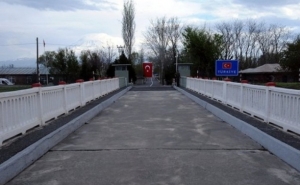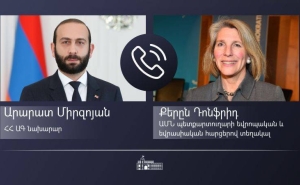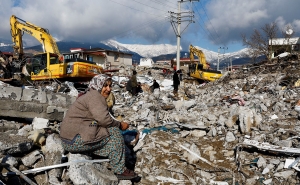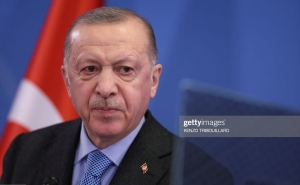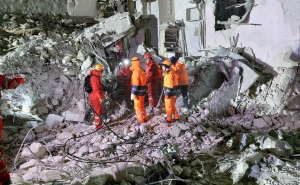Turkey is sending Cold War-era cluster bombs to Ukraine – FP
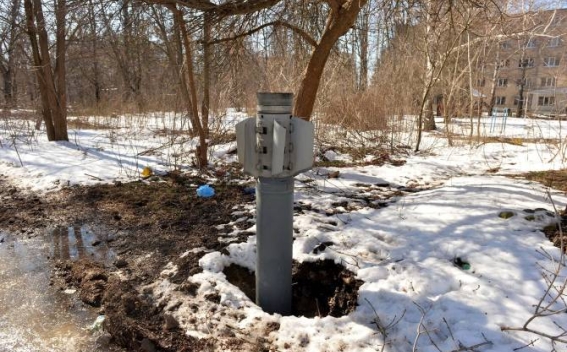
Turkey began sending Ukraine a form of U.S.-designed, artillery-fired cluster bomb in late 2022 after months of Kyiv pleading with the Biden administration for the munitions, Foreign Policy reported citing current and former U.S. and European officials familiar with the decision.
The NATO ally Turkey began sending the first batches of so-called dual-purpose improved conventional munitions (DPICMs) in November 2022, which were made during the Cold War era under a co-production agreement with the United States. The weapons are designed to destroy tanks by bursting into smaller submunitions, which can linger on the battlefield for years if they do not immediately explode. Each round scatters about 88 bomblets. The United States is barred from exporting DPICMs under U.S. law because of its high dud rate, according to the Foreign Policy.
Foreign Policy wrote that the move, which Turkey has sought to keep quiet for months, also highlights the high-wire act that Ankara has played throughout the conflict: supporting Ukraine with armed Bayraktar TB2 drones that helped break Russia’s advance on Kyiv and playing diplomatic middleman for the United Nations-brokered deal to export grain from the Ukrainian port of Odesa, all while purchasing Russian weapons for itself and angering NATO in the process. It was not immediately clear if the Turkish surface-to-surface weapons had been used in combat.
“After the U.S. denied [Ukraine] access to cluster munitions, Turkey was the only place they could get them,” one source briefed on the matter, who spoke on condition of anonymity told Foreign Policy. “It just shows how even as Turkey cozies up to Russia in some respects, it’s become a really important supporter for Ukraine militarily.”
Neither the Turkish Embassy in Washington nor the Ukrainian defense ministry responded to Foreign Policy’s request for comment.
Foreign Policy highlights that Turkey’s delivery of DPICMs showcases how Ankara has played an outsized role in supplying weapons to Ukraine to break Russia’s full-scale invasion at critical moments in the war since Russian President Vladimir Putin ordered the assault in February 2022.
“The Turkish-made Bayraktar TB2 drones helped halt Russian armored convoys converging on Kyiv in the early days of the war, and they reportedly had a role in assisting Ukraine’s sinking of the Russian cruiser Moskva, then the flagship of the Black Sea fleet. Turkish analysts also believe that Turkey is quietly running a drone bridge from Corlu air base near the Bayraktar TB2 factory, where weapons are shipped to Poland and moved to Ukraine. And Turkey has walked a tight line on weapons deliveries: Even as Turkish President Recep Tayyip Erdogan and his brass in Ankara have tried to keep them quiet, some of their close confidantes—including the president’s son-in-law, who is chair of the board of the company that manufactures Bayraktar TB2s—have openly championed the drone’s prowess on the battlefield,” Foreign Policy reported.
Although Turkey has not shared information on the quantities of cluster munitions in its stockpile, the Ankara-based Mechanical and Chemical Industry Corporation has produced an extended-range artillery projectile in the past that can be fired out of 155 mm cannons with self-destructing DPICM submunitions as well as similar projectiles that are under license from the United States. Roketsan, another major Turkish weapons producer, once made TRK-122 rockets for 122 mm artillery systems that also scatter DPICM submunitions. Slovakia, Chile, and the United States have transferred cluster munitions to Turkey in the past, according to Foreign Policy.
“But the move still is a reversal of sorts for Turkey, after it made pledges to the international disarmament community that it would not use cluster munitions. In a letter sent to the president of the Convention on Cluster Munitions, a Geneva-based international organization, in October 2021 and obtained by Foreign Policy, Turkey insisted that it had not used, produced, imported, or transferred cluster munitions since 2005—when the convention was implemented—and did not intend to do so in the future.”
Other materials on this subject
- 2 dead, 2 injured after fire at lodging section of Armenian Catholic Church in Istanbul He said the firefighter-rescue team arrived immediately. Armenian Catholic Archeparch of Istanbul Archbishop Lévon Zékiyan was also on the scene.
- Fire erupts in Turkey’s Black Sea port of Samsun following explosion The causes for the explosion that led to a fire are currently being analyzed.
- EU Urges Turkey to Stop Offering Russia Solutions to Circumvent Sanctions Speaking about the EU's engagement with Turkey, an important neighbor, EU partner and candidate country for EU membership, we stress the importance of ensuring that Turkey's foreign policy is aligned with...
- Any Change of Internationally Recognized Borders in Region is Unacceptable – Iranian President to Erdogan "The basis of our policy in the region is that the fates of the countries must be determined by themselves and that their national sovereignty and territorial integrity must be respected" Raisi told Erdogan...
- Azerbaijan, Turkey FMs Discuss Regional Situation During the phone talk, the two FMs exchanged opinions on the current regional situation and the agenda of bilateral cooperation.
Other materials on this subject
- Los Angeles mayor and city council president address US president on Lachin corridor issue Thank you, Mayor Bass, for joining me in communicating to President Biden the urgent need for U.S. leadership to lift the blockade and bring humanitarian relief to the people of Artsakh.
- US Committed to Helping Armenia and Azerbaijan Resolve Issues Peacefully: Blinken Spoke With Pashinyan The Secretary reiterated our commitment to helping Armenia and Azerbaijan resolve issues peacefully.
- Iran to Submit Final Conclusion Over Nuclear Deal Revival by Midnight In comments on Monday, Amirabdollahian said Iran is going to send its final conclusion about the JCPOA talks to the European coordinator in written form at midnight.
- Erdogan, Biden Might Meet in September- Media Turkey plans to buy 40 F-16 fighter jets from the US and upgrade another eighty. US President Joe Biden stated that he expects to receive the approval of the [US] Congress to sell F-16 fighter jets to...
- The United States Announced Its Readiness For a Dialogue With Russia on the Future of Arms Control We are ready to resume dialogue with Russia to shape the future of modern arms control if Russia is ready to act in good faith.
Other materials on this subject
- Ukraine Election: Zelensky's Party Set to Win Big in Parliamentary Vote This was followed far behind by the pro-Russian party Opposition Platform for Life, which secured 12.8%, and former Ukrainian president Petro Poroshenko's party, European Solidarity, with 8.7%.
- Poroshenko: Political Portrait: From A Holiday in the Maldives to the Armenian Genocide The Ukrainians want to end the war and the crazy tariffs, they want higher salaries. People have nothing to pay the bills with and to buy food for. Instead, Poroshenko offers a triad - "army, language,...
- “People’s Servant,” From Movie to Reality He has already been a president, but in a TV series. He is a young actor, showman, host, screen writer. He is also a businessman, however not a politician.
- 2019 Ukrainian Presidential Elections: Key Candidates, Key Data March 31, 2019 will see the next presidential polls in Ukraine.
-
 17:08
17:08The regular session of the Anti-corruption Policy Council takes place in Jermuk
-
 15:05
15:05The Prime Minister sends congratulatory messages to the supreme leader of Iran and the President of Iran
-
 11:11
11:11Armenia sends earthquake aid to Turkey
-
 10:43
10:43Commemoration of the Pontiff St. Sahak Partev
-
 09:16
09:16Some roads are closed and difficult to pass in Armenia
-
 19:55
19:55Phone conversation of the Foreign Minister of Armenia with the U.S. Assistant Secretary of State for European and Eurasian Affairs
-
 18:30
18:30Prime Minister Pashinyan and President Khachaturyan meet
-
 18:20
18:20Ararat Mirzoyan with Co-Chairman of the OSCE Minsk Group of France Brice Roquefeuil
-
 17:01
17:01Humans could land on Mars within 10 years, Musk predicts
-
 16:45
16:45France, US urge 'immediate' end to Nagorno Karabakh blockade
-
 16:01
16:01Blockaded Nagorno Karabakh launches fundraiser to support quake-hit Syria
-
 15:59
15:59Earthquake death toll in Turkey rises to 18,342
-
 15:43
15:43Ararat Mirzoyan Held a Telephone Conversation with Sergey Lavrov
-
 15:06
15:06French president rules out fighter jet supplies to Ukraine in near future
-
 14:47
14:475 Day Weather Forecast in Armenia
-
 14:44
14:44President Vahagn Khachaturyan wrote a note in the book of condolences opened in the Embassy of Syria in Armenia
-
 14:20
14:20Azerbaijan’s provocations impede establishment of peace and stability – Armenian FM tells Russian Co-Chair of OSCE MG
-
 12:57
12:57France representation to OSCE: Paris calls on Azerbaijan to restore freedom of movement through Lachin corridor
-
 11:40
11:40Command of Kosovo forces highly appreciated preparation of Armenian peacekeepers
-
 10:16
10:16The United States withdrew from sanctions against Syria for six months the provision of assistance after the earthquake
day
week
month
Humidity: %
Wind: km/h


